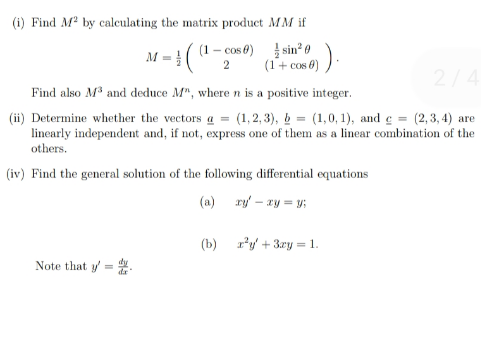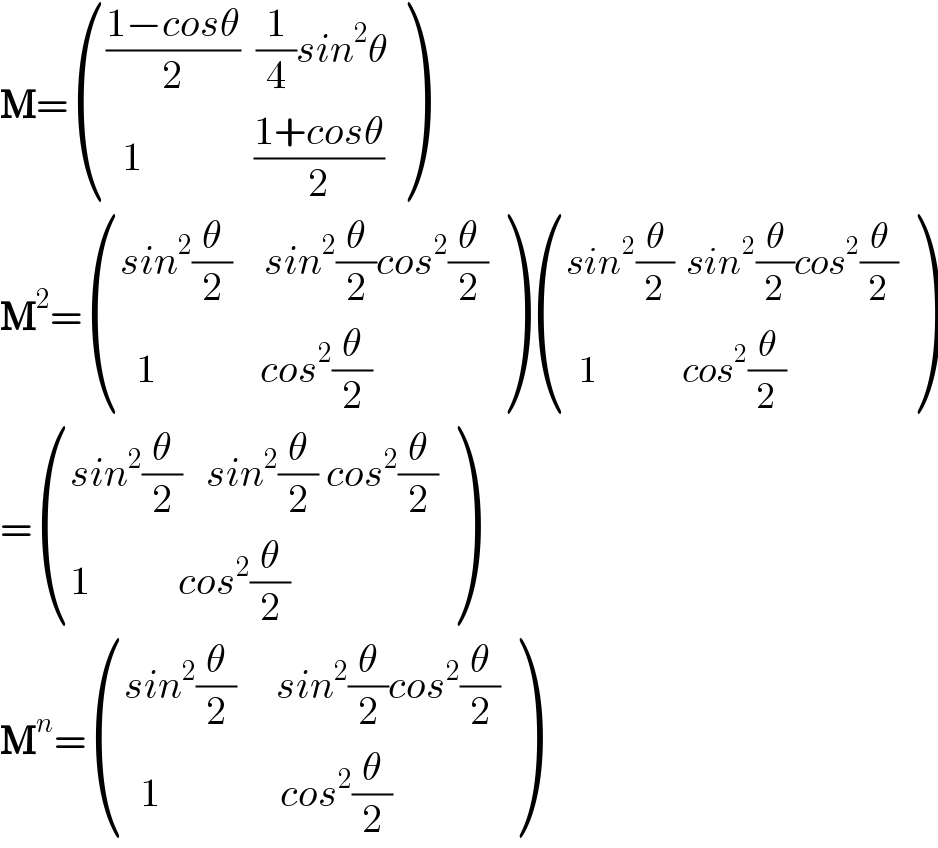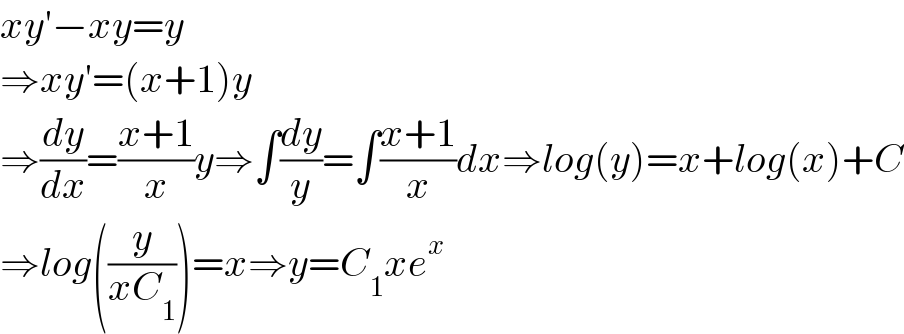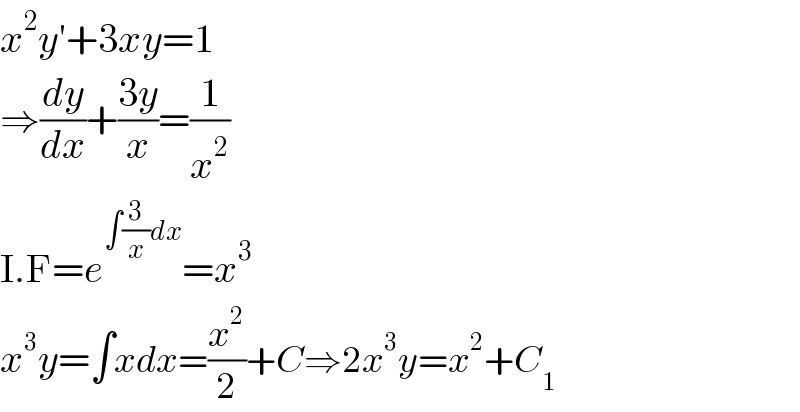
Question Number 141303 by BHOOPENDRA last updated on 17/May/21

Commented by BHOOPENDRA last updated on 17/May/21

$${iv} \\ $$
Answered by Dwaipayan Shikari last updated on 17/May/21

$$\boldsymbol{\mathrm{M}}=\begin{pmatrix}{\frac{\mathrm{1}−{cos}\theta}{\mathrm{2}}\:\:\frac{\mathrm{1}}{\mathrm{4}}{sin}^{\mathrm{2}} \theta}\\{\:\:\mathrm{1}\:\:\:\:\:\:\:\:\:\:\:\:\:\:\frac{\mathrm{1}+{cos}\theta}{\mathrm{2}}}\end{pmatrix} \\ $$$$\boldsymbol{\mathrm{M}}^{\mathrm{2}} =\begin{pmatrix}{{sin}^{\mathrm{2}} \frac{\theta}{\mathrm{2}}\:\:\:\:{sin}^{\mathrm{2}} \frac{\theta}{\mathrm{2}}{cos}^{\mathrm{2}} \frac{\theta}{\mathrm{2}}}\\{\:\:\mathrm{1}\:\:\:\:\:\:\:\:\:\:\:\:\:{cos}^{\mathrm{2}} \frac{\theta}{\mathrm{2}}}\end{pmatrix}\begin{pmatrix}{{sin}^{\mathrm{2}} \frac{\theta}{\mathrm{2}}\:\:{sin}^{\mathrm{2}} \frac{\theta}{\mathrm{2}}{cos}^{\mathrm{2}} \frac{\theta}{\mathrm{2}}}\\{\:\:\mathrm{1}\:\:\:\:\:\:\:\:\:\:\:\:\:\:{cos}^{\mathrm{2}} \frac{\theta}{\mathrm{2}}}\end{pmatrix} \\ $$$$=\begin{pmatrix}{{sin}^{\mathrm{2}} \frac{\theta}{\mathrm{2}}\:\:\:{sin}^{\mathrm{2}} \frac{\theta}{\mathrm{2}}\:{cos}^{\mathrm{2}} \frac{\theta}{\mathrm{2}}}\\{\mathrm{1}\:\:\:\:\:\:\:\:\:\:\:{cos}^{\mathrm{2}} \frac{\theta}{\mathrm{2}}}\end{pmatrix} \\ $$$$\boldsymbol{\mathrm{M}}^{{n}} =\begin{pmatrix}{{sin}^{\mathrm{2}} \frac{\theta}{\mathrm{2}}\:\:\:\:\:{sin}^{\mathrm{2}} \frac{\theta}{\mathrm{2}}{cos}^{\mathrm{2}} \frac{\theta}{\mathrm{2}}}\\{\:\:\mathrm{1}\:\:\:\:\:\:\:\:\:\:\:\:\:\:\:{cos}^{\mathrm{2}} \frac{\theta}{\mathrm{2}}}\end{pmatrix} \\ $$
Answered by Dwaipayan Shikari last updated on 17/May/21

$${xy}'−{xy}={y} \\ $$$$\Rightarrow{xy}'=\left({x}+\mathrm{1}\right){y} \\ $$$$\Rightarrow\frac{{dy}}{{dx}}=\frac{{x}+\mathrm{1}}{{x}}{y}\Rightarrow\int\frac{{dy}}{{y}}=\int\frac{{x}+\mathrm{1}}{{x}}{dx}\Rightarrow{log}\left({y}\right)={x}+{log}\left({x}\right)+{C} \\ $$$$\Rightarrow{log}\left(\frac{{y}}{{xC}_{\mathrm{1}} }\right)={x}\Rightarrow{y}={C}_{\mathrm{1}} {xe}^{{x}} \\ $$
Commented by BHOOPENDRA last updated on 17/May/21

$${tq}\:{sir}\:{but}\:{in}\:{upper}\:{problem}\:{i}\:{also}\:{need} \\ $$$${part}\:{two} \\ $$
Answered by Dwaipayan Shikari last updated on 17/May/21

$${x}^{\mathrm{2}} {y}'+\mathrm{3}{xy}=\mathrm{1} \\ $$$$\Rightarrow\frac{{dy}}{{dx}}+\frac{\mathrm{3}{y}}{{x}}=\frac{\mathrm{1}}{{x}^{\mathrm{2}} } \\ $$$$\mathrm{I}.\mathrm{F}={e}^{\int\frac{\mathrm{3}}{{x}}{dx}} ={x}^{\mathrm{3}} \\ $$$${x}^{\mathrm{3}} {y}=\int{xdx}=\frac{{x}^{\mathrm{2}} }{\mathrm{2}}+{C}\Rightarrow\mathrm{2}{x}^{\mathrm{3}} {y}={x}^{\mathrm{2}} +{C}_{\mathrm{1}} \\ $$
